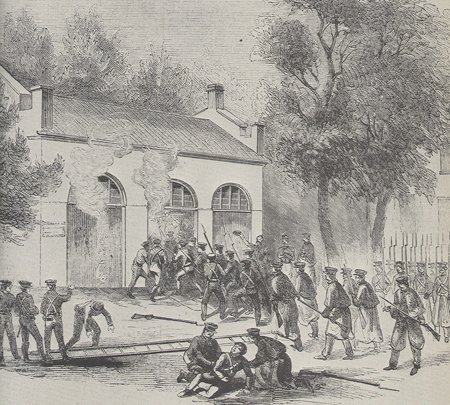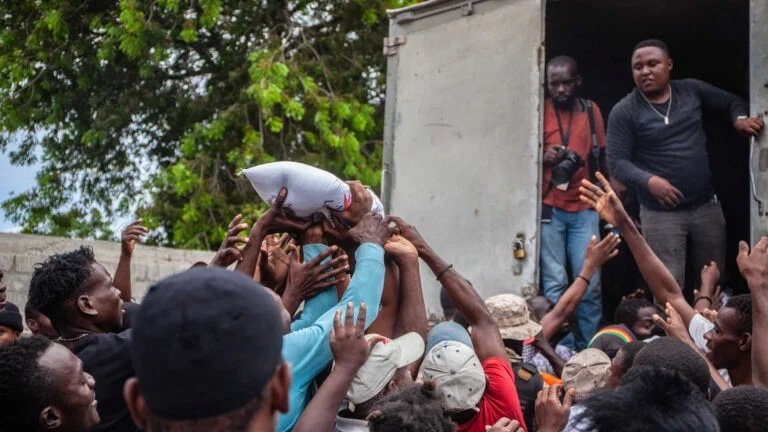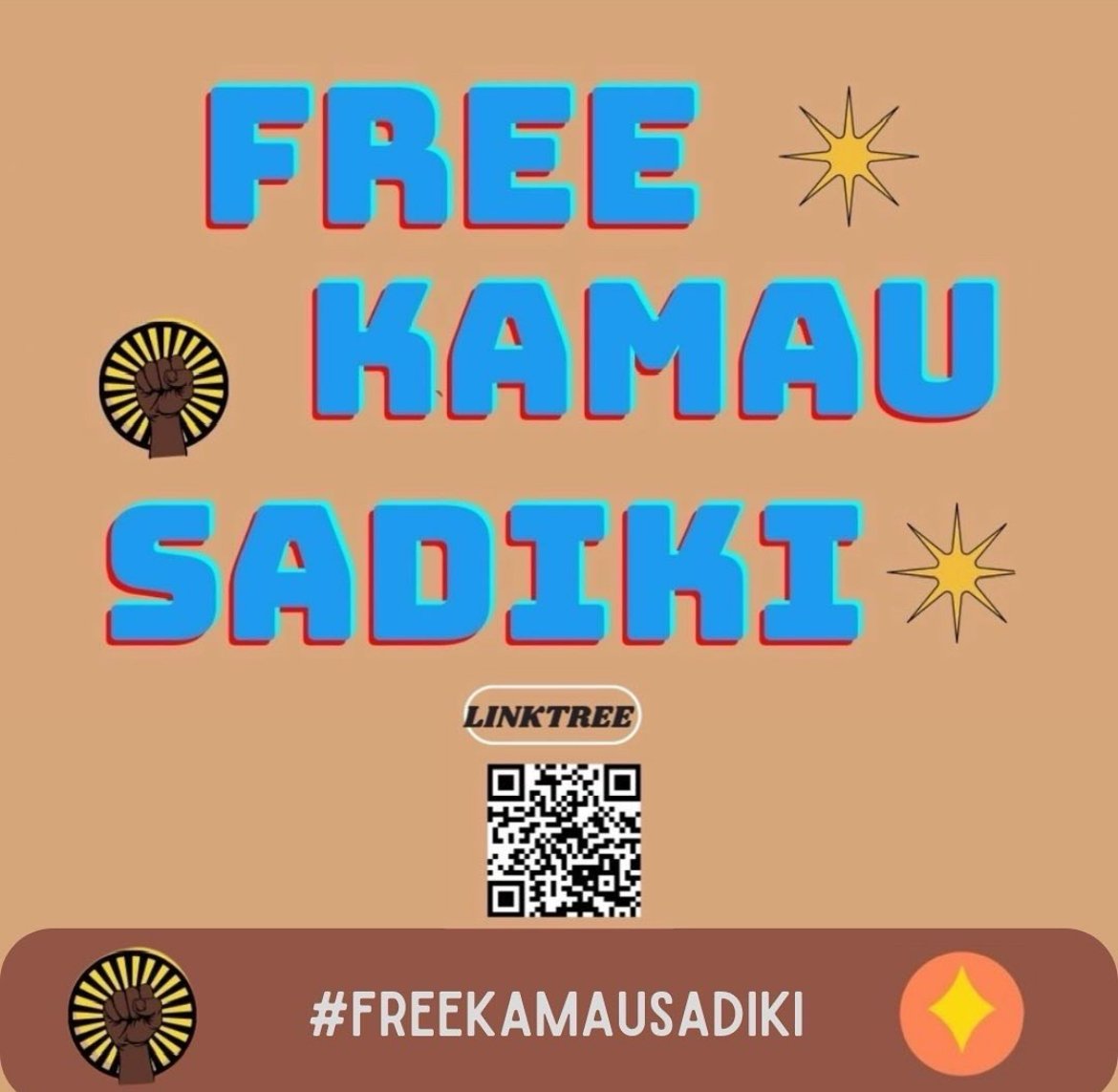Learning from History:
Grounding Abolition and Education Justice in Revolutionary Struggle
We root our abolitionist and education justice movements in the power and lessons of revolutionary histories. To build toward liberation, we must understand and learn from the struggles that came before us. From the Haitian Revolution to Black Reconstruction, from the organizing of the Black Panther Party to the movements to shut down prisons, defund police, and stop Cop City, we carry forward a long legacy of rebellion, transformation, and creation.
We frame abolition not only as the dismantling of prisons and policing, but as the abolition of carcerality itself—the deeply embedded systems designed to punish, contain, and control. These carceral structures include white supremacy, slavery, colonialism, anti-Blackness, imperialism, racial capitalism, and occupation. They manifest in every aspect of our society, especially in the experiences of Black, Latine, immigrant, and working-class youth in schools. From over-policing and underfunding to cultural erasure and exclusion, schooling is a tool of control rather than liberation, and true education.
To grow our movements today, we draw on the spirit of Sankofa—to look back and recover what we must carry forward. Our historical timeline connects generations of abolitionist and revolutionary struggle to our work now, helping us remember that education justice is inseparable from the fight to dismantle systems of harm and build new ways of living, learning, and being together.
History of Abolitionist Movements
TIMELINE
Haitian Revolution Begins, 1791
Thousands of enslaved people launch an insurrection in French Saint-Domingue (Haiti), initiating a 13-year struggle that abolishes slavery and colonial rule. By 1804, Haiti becomes the first independent Black republic, striking a major blow to colonial slavery.
Nat turner’s rebellion / Southampton insurrection, 1831
Nat Turner’s Rebellion was a powerful uprising led by Nat Turner, an enslaved preacher, in Virginia in 1831. He and a small group of enslaved people killed around 55–65 white people in a bold attempt to overthrow the system of slavery. Though the revolt was suppressed, it sent shockwaves through the South and energized the abolitionist movement in the North. Turner’s actions and words became a symbol of Black resistance and a reminder of the deep desire for liberation among the enslaved.
Baptist War Uprising in Jamaica, 1831
The largest slave revolt in British Caribbean history erupts in Jamaica, led by Samuel Sharpe. Lasting 10 days and involving 20,000 enslaved people, the “Baptist War” accelerates debates that lead to Britain’s Slavery Abolition Act of 1833.
Fugitive Slave Law Sparks Resistance, 1850
The U.S. Congress passes the Fugitive Slave Act of 1850, mandating the return of escapees, which triggers fierce abolitionist resistance. Vigilance Committees, the Underground Railroad, and acts like the 1851 Christiana Riot in Pennsylvania openly defy the law, expanding the anti-slavery movement.
John Brown’s Raid on Harpers Ferry, 1859
White abolitionist John Brown leads a multiracial band in a raid on the federal armory at Harpers Ferry, Virginia (now West Virginia), aiming to spark a slave insurrection. The attempt fails militarily and Brown is executed, but his bold action inflames national tensions on slavery ahead of the Civil War.
U.S. Marines Attacking John Brown and Other Men at Harper’s Ferry
Black Reconstruction in the U.S., 1860-80
Following the abolition of slavery and Civil War, the Reconstruction era marked a transformative period when formerly enslaved Black people actively reshaped the South and broader U.S. Black communities built networks of schools, churches, political organizations, and civic institutions. Guided by visions of racial justice and democracy, Black Reconstruction was both a grassroots movement and a contested political project. It faced violent resistance from white supremacists laying the groundwork for the Jim Crow era. W.E.B. Du Bois termed this period “Black Reconstruction,” highlighting the role of Black people in actively reconstructing democracy via the struggle for self determination, freedom, education, and labor rights.
Abyssinia (Ethiopia) Abolishes Slavery, 1872
Emperor Yohannes IV of Abyssinia (Ethiopia) issues a decree in 1872 abolishing the slave trade and slavery within the empire. Though enforcement is uneven, it represents a significant step by an African ruler toward dismantling an age-old institution, under internal reformist and external diplomatic pressures.
Algerian War of INDEPENDENCE begins, 1954
The National Liberation Front (FLN) launches coordinated attacks across French Algeria on Toussaint Rouge (“Red All Saints’ Day”), sparking an eight-year war. The Algerian War (1954–1962) ends 132 years of French settler colonial rule, with independence in 1962 achieved at immense human cost.
Cuban revolution triumphs, 1959
Fidel Castro’s 26th of JulyMovement and allied rebels oust Cuban dictator Fulgencio Batista on New Year’s Day 1959. The revolutionary government soon abolishes Batista’s repressive police forces and enacts sweeping land reform, literacy, and healthcare campaigns, dismantling many colonial and neocolonial structures in Cuban society.
CONGO AChieves independence, 1960
The Democratic Republic of the Congo declares independence from Belgian colonial rule on June 30 1960. Patrice Lumumba’s speech denounces colonial atrocities and calls for true self-determination. Though Lumumba is assassinated in 1961, Congo’s freedom inspires anti-colonial movements continent-wide
Black Panther party founded in oakland, 1966
Huey P. Newton and Bobby Seale establish the Black Panther Party for Self-Defense in West Oakland, California, amid rising police brutality. By 1969, the Panthers create “Survival Programs” like Free Breakfast for Children, health clinics, and liberation schools, directly serving Black communities.
Attica prison uprising & aftermath, 1973
Responding to brutal conditions, about 1,300 incarcerated men take over New York’s Attica prison in Sept 1971, demanding reforms. After four days, Governor Rockefeller orders a retaking; 43 people die (mostly killed by troopers). In 1973 the state settles inmates’ lawsuits and reforms some prison practices, making Attica a searing symbol of prisoners’ human-rights struggles.
Soweto uprising in apartheid south america, 1976
Between 3,000 and 10,000 Black students in Soweto protest Afrikaans-language instruction; police respond with tear gas and live bullets. An estimated 20,000 students join as the revolt spreads, galvanizing global anti-apartheid support. June 16 is now Youth Day in South Africa, honoring those killed in the struggle.
Zimbabwean Independence Ends White Rule, 1980
The Republic of Zimbabwe is born as independence leader Robert Mugabe takes office on Apr 18 1980, ending nearly a century of white-minority colonial rule. The new government faces dismantling apartheid-like structures; education, healthcare, and land reform expand, though equitable land redistribution remains a challenge.
UN Conference in Durban, 2001
The UN World Conference against Racism, Racial Discrimination, Xenophobia and Related Intolerance in Durban concludes with an NGO Forum Declaration that labels the transatlantic slave trade a crime against humanity and calls for reparations. Despite U.S. and Israeli walkouts, the conference amplifies global demands to redress colonialism and ongoing racial injustices.
Post-Katrina Mutual Aid in New Orleans, 2005
After Hurricane Katrina and the government turned their back on New Orleans residents, Common Ground Collective activists establish mutual-aid distribution, free clinics, and security patrols. Their grassroots response, under the slogan “Solidarity Not Charity,” exemplifies abolitionist community care amid state failure.
Gaza Freedom March & Anti-Siege Protests, 2009
Israel’s assault on Gaza (Operation Cast Lead) spurs global protests. Grassroots movements like the Gaza Freedom March (Dec 2009) bring 1,400 international activists to Egypt aiming to march into Gaza, highlighting Palestinian calls to end collective punishment and for freedom of movement.
Haiti Earthquake – Mutual Aid Response, 2010
A 7.0 earthquake strikes Haiti, killing 200,000+. Haitian grassroots groups and global civil society mobilize in solidarity. Local groups emphasize community-led rebuilding, food sovereignty, and resisting NGO colonialism in aid
Marikana Miners’ Strike & Massacre, 2012
In Aug 2012, 3,000 platinum miners in Marikana, South Africa, strike for living wages. Police open fire on Aug 16, killing 34 workers—the deadliest state use of force since apartheid. The massacre sparks outrage and new union organizing; in 2014 miners win wage increases.
Black Lives Matter Movement Born, 2013
Following the acquittal of Trayvon Martin’s killer, Alicia Garza, Patrisse Cullors, and Opal Tometi coin #BlackLivesMatter. BLM grows after high-profile police killings, reviving abolitionist critiques of policing/prisons and building community self-defense projects nationwide.
Ferguson Uprising Against Police Violence, 2014
The fatal police shooting of Michael Brown in Ferguson, Missouri, ignites weeks of protests met by militarized police. Ferguson catalyzes a new generation of Black activism, propelling demands to end racist police brutality and spawning national calls to demilitarize and defund police.
NoDAPL: Standing Rock Pipeline Uprising, 2016
The Standing Rock Sioux and allies establish Sacred Stone Camp resisting the Dakota Access Pipeline. Thousands join, making it a historic Indigenous-led protest linking environmental racism and treaty rights; the movement inspires ongoing fights against resource colonialism.
National Prison Strike for Abolition, 2018
Incarcerated organizers across at least 17 U.S. states launch a coordinated prison labor strike (Aug 21–Sept 9 2018). Demands include ending prison slavery (13th-Amendment clause), sentencing reform, and restoring voting rights, amplifying abolitionist calls to end mass incarceration.
global uprisings, 2020
In 2020, the police killings of George Floyd, Breonna Taylor, Ahmaud Arbery, Tony McDade, Rayshard Brooks, and others ignited a wave of protests across the U.S. and around the world. Taking place amid the COVID-19 pandemic, these uprisings demanded an end to police violence and systemic anti-Black racism. In response, people mobilized grassroots mutual aid networks to meet urgent needs in the presence of rampant state violence. The movement amplified calls to defund and abolish the police, drawing from abolitionist legacies and calling for investment in healthcare, housing, and education.
#StopCopCity & Community Defense (Atlanta), 2021
After a 2017 proposal to build a huge Atlanta police training complex on forest land, local abolitionists, environmentalists, and Indigenous Muscogee activists unite to resist. Forest encampments (2021-2023) delay construction through direct action and a referendum campaign, merging policing and climate-justice struggles.
Palestinian Prisoner Break & Gaza Siege Protests, 2023
Over 200 Palestinian prisoners escape Gaza’s central prison as conflict erupts. Amid Israel’s ensuing siege, global protests demand an end to what many call an “open-air prison.” Student encampments proliferate in 2024, linking Palestinian liberation with anti-colonial, abolitionist solidarity.
Kamau Sadiki Granted Parole, 2025
Former Black Panther Kamau Sadiki (Freddie Hilton), imprisoned since 2002, is granted parole after sustained advocacy. Gravely ill, he is apart of the aging U.S. political prisoners; his release marks the importance of FREEING them all!





